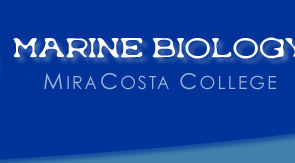|
 |
 |
 |
The following links include information about specific careers in Marine Biology:
|
The first link is to a branch of the National Oceanic and Atmospheric Administration. This site provides info about careers as well as courses you should take as a Biology major and graduate programs in Marine Biology.
The second link is a great source of information about various careers in marine fields provided by Hopkins Marine Station at Stanford University. |
|
|
One of my most frequently asked questions is, “what careers are available in Marine Sciences?”
Marine Sciences include many curricular groups. Here is a list of a few specific areas of study in marine sciences:
- Marine Biology
- Marine Biology is the observational and experimental study of all aspects of the genetics, behavior, ecology, evolution, and physiology of marine organisms.
- Biological Oceanography
- Biological Oceanography examines the interactions between marine organisms and their physical and chemical environment.
- Physical Oceanography
- This field is concerned with how water moves and mixes in the ocean, changes in its properties, and how water carries and distributes dissolved chemicals, nutrients, plankton, and pollutants.
- Marine Chemistry and Geochemistry
- These disciplines investigate the chemistry of seawater; ocean circulation and mixing based on chemical and isotopic tracers; marine natural products; geochemistry of volcanic and geothermal phenomena; chemical exchanges between the ocean and the atmosphere; geochemical cycles of various key elements that make up our planet; geochemistry of meteorites; atmospheric trace gas chemistry; and paleoatmospheric composition recorded in polar ice cores, corals, and sediments.
- Geology
- Marine geologists specialize in examining continental geology (especially volcanology), island formation, seismology, and other aspects of the dynamics of the Earth’s crust.
- Geophysics
- If you excel at mathematics and physics, then you’d make a great Geophysicist. These scientists aim to understand the processes (seismic, geodetic) in the Earth and planets.
- Applied Ocean Science
- Applied Ocean Sciences focus on how technology can be used to explore the ocean. As an applied ocean scientist you may study marine acoustics, air-sea interaction, sediment transport and other coastal processes, optics, electromagnetics, and other aspects of physical oceanography.
- Fisheries Management
- Fisheries scientists study anthropogenic impacts on the sea, population structures and dynamics, short and long-term ecosystem change, and issues related to fisheries sustainability and governmental national and international management decisions.
- Climate Studies
- Scientists who study climate are interested in the dynamics of the ocean, atmosphere, ice caps, and terrestrial systems.
|
|







